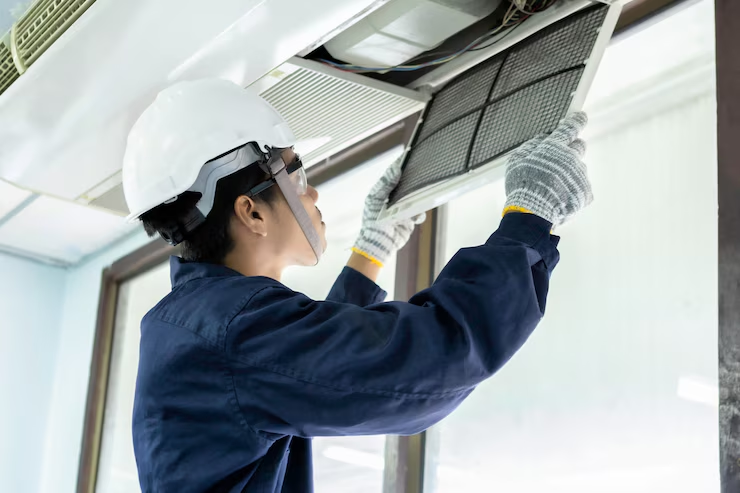How an HVAC Vent Works and Why It’s Important for Your Home Comfort

An HVAC Vent plays a vital role in keeping your home comfortable all year round. Whether it’s heating during the winter or cooling in the summer, HVAC vents are essential for the efficient flow of air throughout your home. Understanding how these vents work can help you maintain a comfortable indoor environment and improve your system’s performance.
If you’ve ever wondered why your room feels warmer or cooler than the rest of your house, it might be time to take a closer look at your HVAC vent system. Proper air distribution starts with the vents, and ensuring they are in good shape is key to achieving the best comfort and energy savings.
What is an HVAC Vent and How Does it Affect Your Home’s Airflow?
An HVAC vent is a key part of your heating, ventilation, and air conditioning (HVAC) system. It is responsible for distributing air from the HVAC system into different rooms of your house. Without these vents, your home would not have proper airflow, making it difficult to maintain a comfortable indoor environment.
When your HVAC vent is working well, it helps air circulate through your house evenly. This means that your home will be at the right temperature no matter what season it is. A good airflow from HVAC vents also ensures that fresh air replaces stale air, improving the overall quality of the air inside.
In short, HVAC vents keep your home comfortable by ensuring the right balance of air is being circulated. Properly working vents also make your HVAC system more energy-efficient, saving you money on your energy bills.
How HVAC Vents Improve Indoor Air Quality and Comfort
HVAC vents do more than just control the temperature in your home—they also help keep the air clean. Airflow from the HVAC vents can remove allergens like dust, pollen, and pet dander, which can make breathing easier, especially if you suffer from allergies.
Clean Air:
- Air filters work alongside HVAC vents to trap dust and allergens.
- A well-maintained HVAC vent system helps keep air fresh and breathable.
By keeping airflow steady and fresh, HVAC vents contribute to a comfortable living environment. They help balance the temperature while ensuring that air quality stays healthy.
Additionally, proper air distribution from the HVAC vent system prevents hot and cold spots in the home, which can cause discomfort. When air circulates properly, your living space feels more even, helping everyone feel more relaxed.
Top Tips for Maintaining Your HVAC Vents to Save Energy
Maintaining your HVAC vents is an easy and effective way to save energy and reduce your utility bills. By keeping your vents clean and clear, the system runs more efficiently, using less power to heat or cool your home.
- Regular Cleaning: Make sure to clean your vents every few months. Dust and dirt can block airflow, causing the system to work harder.
- Check for Blockages: Ensure that furniture or rugs are not blocking the vents. Blocked vents can cause the HVAC system to waste energy.
- Seal Leaks: Leaky ducts can lose air, making your system less efficient. Ensure ducts are well-sealed to avoid wasting energy.
By maintaining your HVAC vents, you’re helping the system work better and using less energy, which is good for the environment and your wallet.
The Role of HVAC Vents in Heating and Cooling Efficiency
HVAC vents play a crucial role in how effectively your heating and cooling system works. These vents help distribute air evenly throughout the home, ensuring that the temperature stays comfortable in every room.
Airflow Distribution:
- Properly placed vents ensure uniform heating and cooling throughout your home.
- If your HVAC vents are improperly placed, certain rooms may feel too hot or too cold.
When the HVAC vent system is functioning as it should, it allows your home to stay at a comfortable temperature without wasting energy. This is especially important in areas with extreme weather conditions, like very hot summers or cold winters.
Why Properly Positioned HVAC Vents Can Boost Your Home’s Comfort
Correctly positioning your HVAC vents can make a huge difference in your home’s comfort level. Vents placed in the right spots allow air to circulate more evenly, ensuring a more consistent temperature in every room.
Key Points to Consider:
- Place vents in the center of rooms to ensure even airflow.
- Avoid placing vents behind furniture or in corners, as this can block air from flowing freely.
Proper vent placement allows your HVAC system to work at its best, providing even cooling or heating and improving your overall comfort. Additionally, positioning vents correctly can prevent your system from overworking, which helps extend its lifespan.
Signs Your HVAC Vents Need Repair or Cleaning

Sometimes HVAC vents can become damaged or clogged, which can affect their performance. It’s important to know the signs that indicate your HVAC vents need repair or cleaning.
Look for these signs:
- Poor airflow: If certain rooms feel too hot or cold, your vents may be blocked or damaged.
- Dust build-up: Excessive dust around vents might indicate a need for cleaning.
If you notice any of these signs, it’s best to inspect your HVAC vents or call a professional to ensure everything is working properly. Regular checks can prevent bigger problems in the future and keep your system running efficiently.
Troubleshooting Common HVAC Vent Issues: What Homeowners Should Know
Sometimes your HVAC vents might not be working as they should, and understanding how to troubleshoot these issues can save you time and money. Common problems like poor airflow, strange noises, or uneven temperatures can often be fixed with some basic maintenance.
Simple Solutions:
- Check if vents are blocked by furniture or dust.
- Replace air filters regularly to keep airflow smooth.
If you’ve tried these solutions and your HVAC system is still not working well, it may be time to call a professional to inspect and fix the problem. Regular care can prevent major issues and help your HVAC system perform at its best.
How to Maximize the Performance of Your HVAC Vents
Maximizing the performance of your HVAC vents is key to making sure your heating and cooling system runs efficiently. Proper maintenance and care of your vents ensure they perform well for years and provide the best air quality and comfort for your home.
Steps to Maximize Performance:
- Clean Vents Regularly: Dust and dirt can reduce airflow, so keep your vents clean.
- Check Airflow: Ensure that all vents are open and unobstructed to allow proper airflow.
- Install Airflow Boosters: In larger homes, additional fans can be installed to improve airflow.
Taking these simple steps will not only improve your home’s comfort but also help your HVAC system work less hard, saving energy in the long run.
Choosing the Right HVAC Vent for Your Home: What You Need to Know

When it comes to choosing the right HVAC vent for your home, there are several things to consider. The type of vents you choose can impact how well your HVAC system works, and it’s important to find the best options for your home.
Consider These Factors:
- Vent Size: Ensure that the vents you choose are the right size for your HVAC system to provide enough airflow.
- Material: Choose vents made of durable materials like metal for long-lasting performance.
- Style: Vents come in different designs. Choose one that blends with your home decor while still performing efficiently.
The right choice of vents can improve your system’s efficiency, making your home more comfortable while lowering energy costs.
Conclusion
In conclusion, HVAC vents are a crucial part of your home’s heating and cooling system. They help keep the air flowing smoothly, making sure that your home stays comfortable throughout the year. Taking care of your HVAC vents by cleaning and checking for blockages can make a big difference in how well your system works, helping you save energy and money.
By understanding how HVAC vents work and keeping them well-maintained, you can improve your home’s air quality and comfort. Whether it’s heating in the winter or cooling in the summer, good airflow from your HVAC vents is key to making your living space more enjoyable and efficient.
FAQs
Q: What is the purpose of an HVAC vent?
A: The purpose of an HVAC vent is to distribute air from your heating or cooling system throughout your home. It helps maintain a comfortable temperature by allowing airflow into different rooms.
Q: How often should I clean my HVAC vents?
A: You should clean your HVAC vents at least every 3-6 months to remove dust and dirt, which can block airflow and reduce system efficiency.
Q: Can blocked HVAC vents cause problems?
A: Yes, blocked vents can reduce airflow, causing uneven heating or cooling in your home and forcing your HVAC system to work harder, which can increase energy bills.
Q: What can I do if my HVAC vent is making noise?
A: If your HVAC vent is noisy, check for dirt or debris that may be blocking it. If the noise persists, it might be a ductwork issue, and you may need to call a professional.
Q: Can I install new HVAC vents myself?
A: It’s not recommended to install HVAC vents yourself unless you have experience. A professional can ensure that the vents are correctly placed and sized for your system, improving efficiency.